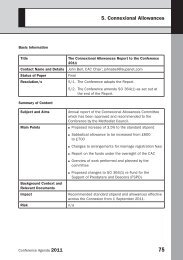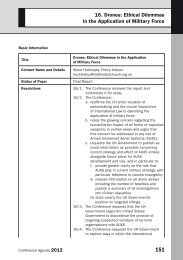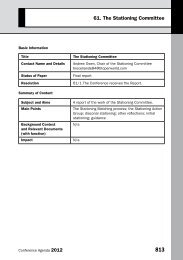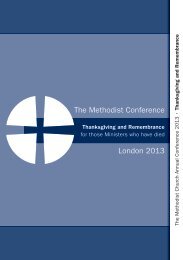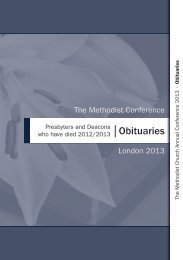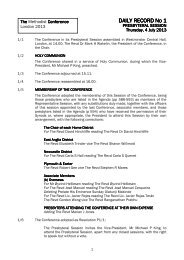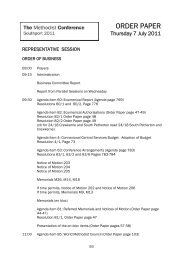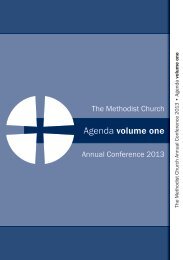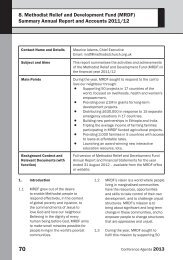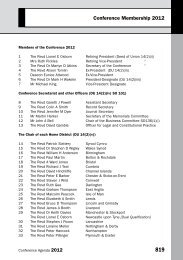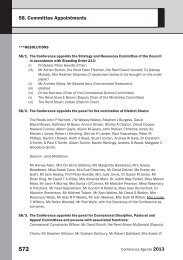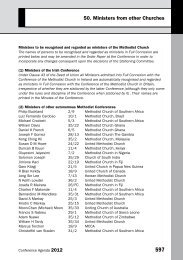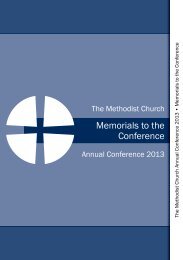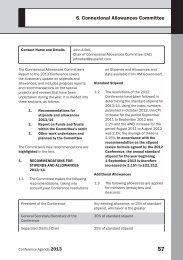Agenda Volume 3 - Methodist Conference
Agenda Volume 3 - Methodist Conference
Agenda Volume 3 - Methodist Conference
Create successful ePaper yourself
Turn your PDF publications into a flip-book with our unique Google optimized e-Paper software.
57. The Fruitful Field Project<br />
is an abundant effusion of the Holy<br />
Spirit on ourselves and our families,<br />
our Societies and our Congregations.”<br />
Accordingly, the resolutions conclude<br />
with the affirmation that “we desire<br />
to ‘continue with one accord in prayer<br />
and supplication’... ‘until the Spirit be<br />
poured upon us from on high, and the<br />
wilderness becomes a fruitful field,<br />
and the fruitful field be counted for a<br />
forest.’” 11 This concluding image is<br />
taken from the thirty-second chapter<br />
of the book of Isaiah, where the<br />
prophet foresees the Spirit’s gifts<br />
creating, for a chastened people, a<br />
land of fruitfulness, righteousness,<br />
quietness and trust. It is a vision<br />
of organic development – a vision<br />
of ploughing, reaping, pruning,<br />
nurture and growth – and, as such,<br />
was judged to be an appropriate<br />
foundational image for a project<br />
which concerns the development of<br />
the Church’s existing connexional<br />
activities in the fields of formation,<br />
learning, training, theological<br />
education, scholarship, research and<br />
development.<br />
27 The primary aims of the project were:<br />
[a] to support the governance<br />
bodies of the <strong>Methodist</strong> Church as<br />
they exercise their oversight of the<br />
Church’s learning and development<br />
infrastructure and programmes, by<br />
providing an overview of the Church’s<br />
connexional commitments and<br />
activities;<br />
[b] to ensure that modifications<br />
and developments across the<br />
Church’s learning and development<br />
infrastructure and programmes<br />
are coherent, and that the work<br />
undertaken across the Church’s<br />
connexional commitments and<br />
activities is consistently reflective,<br />
collaborative, ambitious and<br />
prophetic. 12<br />
28 The report noted that the new Ministries<br />
Committee would be the natural<br />
locus for oversight of the project, and<br />
the project consequently became part<br />
of the work of the Shadow Ministries<br />
Committee during 2010/2011.<br />
The decisions of the 2011 <strong>Conference</strong><br />
29 The 2011 <strong>Conference</strong> received the<br />
report The Fruitful Field project. The<br />
report had been prepared under the<br />
oversight of the Shadow Ministries<br />
Committee and an earlier version<br />
discussed and received by the<br />
<strong>Methodist</strong> Council. The report offered<br />
an overview of the Church’s existing<br />
commitments and resources in the<br />
fields of formation, learning, training,<br />
theological education, scholarship,<br />
research and development; this<br />
overview is revisited in section D<br />
of this report. This overview was<br />
informed by significant research and<br />
consultative work to establish, in<br />
particular, a robust understanding<br />
of the institutions, colleges and<br />
centres sponsored by the <strong>Conference</strong><br />
11 The “Liverpool Minutes 1820”, CPD, Vol 1, Book V, Part 3<br />
12 Ministries, Learning and Development, <strong>Agenda</strong> 2010, 2.4<br />
<strong>Conference</strong> <strong>Agenda</strong> 2012 653



